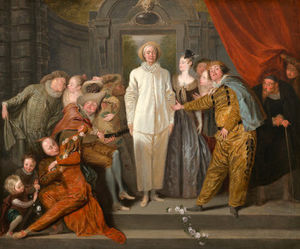| “The endless pursuit of that will of the wisp- the real”- excellent documentary on acting |
Radio Arts Feature |
| Antonia Quirke , Radio 3 and i-Player , August 30, 2017 |
 Antonia Quirke packs a lot of material into her forty-three minutes of documentary. The medium helps. The words are polished and tightly edited. The routes that she follows may be familiar to insiders, following an arc in history, roughly, from Kemble, Kean and Garrick via Olivier to the present time of Sheen and Caine. On the route there is almost certainly something new on offer for every listener.
Antonia Quirke packs a lot of material into her forty-three minutes of documentary. The medium helps. The words are polished and tightly edited. The routes that she follows may be familiar to insiders, following an arc in history, roughly, from Kemble, Kean and Garrick via Olivier to the present time of Sheen and Caine. On the route there is almost certainly something new on offer for every listener. She also makes a short geographical tour in search of the “enigmatic and numinous analysis as to the truthfulness and authenticity in acting.” Her starting-point is the childhood home where Brando appears on the small screen and her father declares him “the greatest actor in the world.” She enters the immense space that is Drury Lane. Edward Kemp of RADA explains that in the nineteenth century the big stages needed big voices and the smoky gas lighting required big gestures. She observes third years at LAMDA in rehearsal and ends in Westminster Abbey with its memorials to Irving, Garrick, Olivier, Ashcroft. Her interviewees span the range of theatre's practitioners. Timothy West recalls the high days of repertory. They were imperfect days but they gave actors breadth, forty-five productions a year in anything from Congreve to Christie. Simon Callow is characteristically expansive on Irving. Geoff Colman of the Central School of Speech and Drama articulates the challenge of Shakespeare- “the skillset requires an intellectual muscularity and spiritual muscularity” fused with voice and body. As for teaching it is as much about “removing thoughts that won't be useful, ideas that won't help.” Robert Hardy, who died this month 3rd August, remembers Philip Burton teaching Richard Burton how to speak for the stage. He continues by relating how Elizabeth Taylor tutored him for screen acting. The screen makes the face forty feet high. “Don't do things” she says “just think”. Other contributors say of their art “it's about being vulnerable” and “it's about the ability to transform and it can be measured and taught and it can be insisted upon.” Michael Sheen: “technique, skill, emotional truth...all have to be in the service of story...to deliver story.” Critics of film and stage feature in the form of David Thomson and Benedict Nightingale. Katie Mitchell describes the difference from the director's perspective between Stanislavsky and Brecht. Lee Strasberg is illustrated in a dialogue between Steiger and Brando in “On the Waterfront”. Stephen Berkoff adds a commentary and Callow again. As to what this will of the wisp art is Antonia Quirke ends her big, broad and deep documentary with the line “great acting is what happens now” with the emphasis on “now.” |
Reviewed by: Adam Somerset |
This review has been read 1774 times There are 34 other reviews of productions with this title in our database:
|
